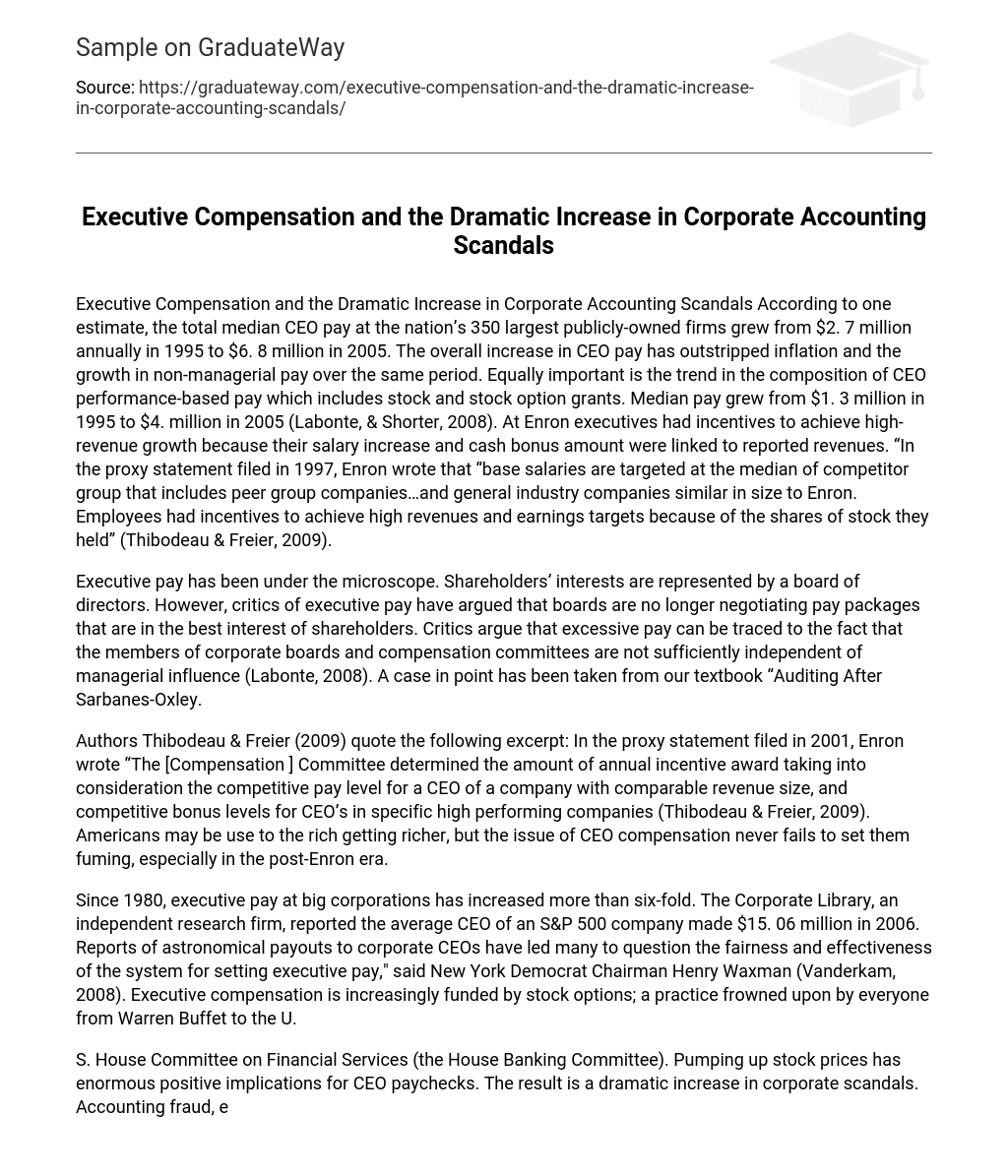According to one estimate, the total median CEO pay at the nation’s 350 largest publicly-owned firms grew from $2. 7 million annually in 1995 to $6. 8 million in 2005. The overall increase in CEO pay has outstripped inflation and the growth in non-managerial pay over the same period. Equally important is the trend in the composition of CEO performance-based pay which includes stock and stock option grants. Median pay grew from $1. 3 million in 1995 to $4. million in 2005 (Labonte, & Shorter, 2008).
At Enron executives had incentives to achieve high-revenue growth because their salary increase and cash bonus amount were linked to reported revenues. “In the proxy statement filed in 1997, Enron wrote that “base salaries are targeted at the median of competitor group that includes peer group companies…and general industry companies similar in size to Enron. Employees had incentives to achieve high revenues and earnings targets because of the shares of stock they held” (Thibodeau & Freier, 2009).
Executive pay has been under the microscope. Shareholders’ interests are represented by a board of directors. However, critics of executive pay have argued that boards are no longer negotiating pay packages that are in the best interest of shareholders. Critics argue that excessive pay can be traced to the fact that the members of corporate boards and compensation committees are not sufficiently independent of managerial influence (Labonte, 2008). A case in point has been taken from our textbook “Auditing After Sarbanes-Oxley.
Authors Thibodeau & Freier (2009) quote the following excerpt: In the proxy statement filed in 2001, Enron wrote “The [Compensation ] Committee determined the amount of annual incentive award taking into consideration the competitive pay level for a CEO of a company with comparable revenue size, and competitive bonus levels for CEO’s in specific high performing companies (Thibodeau & Freier, 2009). Americans may be use to the rich getting richer, but the issue of CEO compensation never fails to set them fuming, especially in the post-Enron era.
Since 1980, executive pay at big corporations has increased more than six-fold. The Corporate Library, an independent research firm, reported the average CEO of an S&P 500 company made $15. 06 million in 2006. Reports of astronomical payouts to corporate CEOs have led many to question the fairness and effectiveness of the system for setting executive pay,” said New York Democrat Chairman Henry Waxman (Vanderkam, 2008).
Executive compensation is increasingly funded by stock options; a practice frowned upon by everyone from Warren Buffet to the U.S. House Committee on Financial Services (the House Banking Committee). Pumping up stock prices has enormous positive implications for CEO paychecks. The result is a dramatic increase in corporate scandals. Accounting fraud, earnings manipulation, and options backdating may have been motivated by attempts to increase to maximize the share price even if the profits aren’t real and to covertly increase executive pay. The out-of-control nature of CEO compensation has been spotlighted by a number of high-profile cases. Divorce proceedings against former General Electric boss Jack Welch revealed a treasure trove of perks from private jets to Knicks tickets. All of these goodies were funded by GE shareholders.
Home Depot’s Bob Nardelli helped the company’s split-adjusted share price drop during his tenure, hurting shareholder value. Enron CEO’s used a variety of deceptive and fraudulent accounting practices to inflate company earnings, manipulate its financial statements to create the illusion of profitability and ultimately reaping unprecedented company perks and enormous bonuses only to bankrupt the company. Former Tyco CEO Dennis Kozlowski spent $1 million of shareholder money on a $2-million party for his wife.
The shindig included an ice sculpture of Michelangelo’s David urinating top-shelf vodka. WorldCom’s Bernie Ebbers became very wealthy from the rising price of his holdings in WorldCom common stock and got a $1. 5 million-per-year pension for bankrupting the company. All of these perks were funded with dollars that could have gone to shareholders. The average shareholder who can’t rely on a company funded-pension or overnment-funded Social Security is funding the lavish lifestyle of the CEO who will get a pay raise (via stock price increases) for downsizing that worker’s job (Beatie, 2008).
There are many other ways that a CEO can hurt a company, but they all boil down to a CEO putting his or her own interests before the company’s. Enron, Tyco, and WorldCom are extreme examples. They are the few bad apples that get all the headlines. For these CEOs, it is apparent how easy it is to forget that their job is to serve the company and its shareholders, not pad their own wallets.
The Enron case is a testimonial as to the relativity and importance implementing the top-down approach for an internal control. By utilizing the top-down approach, Enron’s unusual accounting methods and the detection of major weakness in the company’s financial reporting would have not been overlooked but detected early on in the audit process. Notwithstanding, most companies are run by ethical people. They may bend the rules, but few take the process to the extremes of Enron or WorldCom.
References
- Anand, S. , (2007). Essentials of Sarbanes- Oxley. John Wiley & Sons, Inc. Beattie, A. Pages from the Bad CEO Playbook. Retrieved September 27, 2009, from www. investopedia. com
- Labonte, M. & Shorter, G. (2007). The Economics of Corporate Pay. Congressional Research Service Government and Finance Division.
- Thibodeau, J. C. , & Freier, D. (2009). Auditing after Sarbanes-Oxley: Illustrative Cases. McGraw-Hill, Inc. 2nd Edition.
- Vanderkam, L. , (2008). Cracking the CEO puzzle: why has executive compensation exploded in recent years? The Young Economist.





